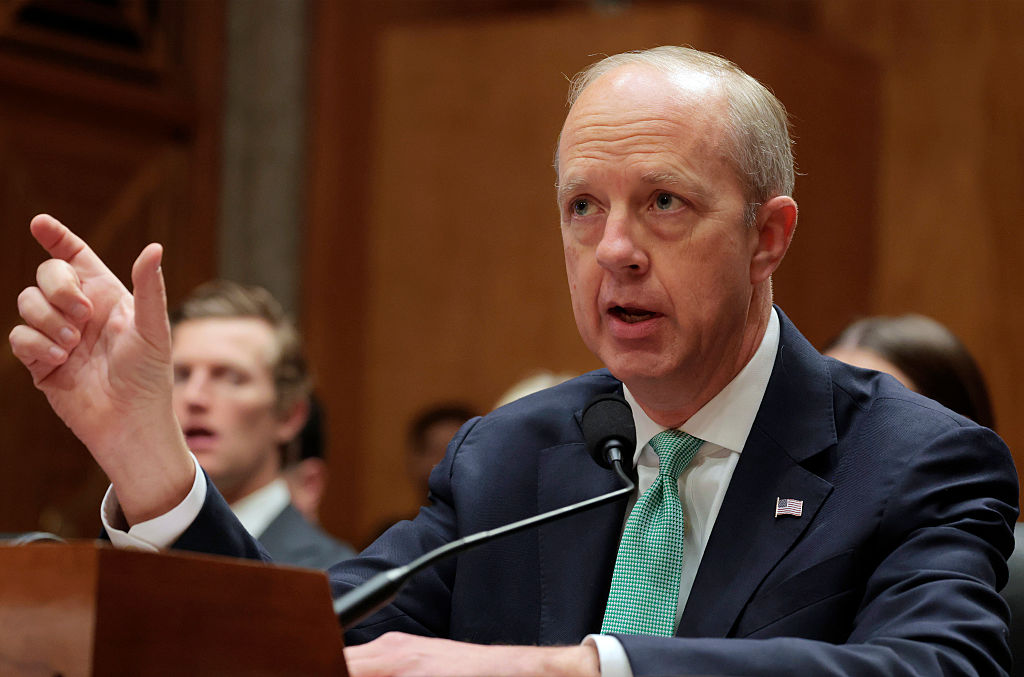The probability of the US entering a recession within the next 12 months has climbed to 43%, according to a new survey from Deutsche Bank.
The figure comes from the average view of 400 people who were surveyed earlier this month and reflects a growing sense of unease among investors, economists, and business leaders.
While key economic indicators such as low unemployment and stable consumer spending suggest that the US economy remains resilient, consumer sentiment data now suggests expectations are rising of a potential downturn.
The survey comes amid increasing market volatility and uncertainty over policy direction from the Trump administration.
Federal Reserve Chair Jerome Powell last week attempted to calm the nation with talk of resilience and stability, saying the economy remains 'strong overall' citing 'significant progress toward our goals over the past two years' - but the facts tell a more complicated story.
The Federal Reserve has revised its 2025 economic growth estimate downward to an annualized 1.7% - the slowest pace outside of the COVID-19 recession since 2011.
Such a bleak projection could be a red flag indicator that a recession looms.
The Fed also raised its core inflation forecast to 2.8%, well above its 2% target following last week's two-day policy meeting.
The probability of the US entering a recession within the next 12 months has climbed to 43% according to a new survey from Deutsche Bank
While politicians argue and economists debate, American households are already feeling the squeeze with grocery prices remaining stubbornly high
Officials still project returning to that target by 2027, but the near-term combination of higher inflation and slower growth is drawing increased scrutiny from economists warning about the risk of stagflation - a dreaded mix of sluggish growth and persistent inflation not seen in the US since the early 1980s.
At that time, gas lines snaked around blocks and interest rates soared to punishing heights.
It's a scenario Powell has tried to dismiss: 'I wouldn't say we're in a situation that's remotely comparable to that,' he told reporters.
Some economists disagree. Barclays analysts said market-based indicators are consistent with only modest slowing, but their projection for US growth this year stands at 0.7%, close to recession levels.
While politicians argue and economists debate, American households are already feeling the squeeze.
Grocery prices remain stubbornly high. Rent increases continue to outpace wages in major cities.
And small businesses, once the backbone of local communities, are finding it harder to access capital or plan for the future in an atmosphere thick with uncertainty.
Federal Reserve Chair Jerome Powell attempted to calm the nation with talk of resilience and stability, saying the economy remains 'strong overall' citing 'significant progress toward our goals over the past two years'
The survey comes amid increasing market volatility and uncertainty over policy direction from the Trump administration
The S&P 500 has dipped since the start of the Trump administration some two months ago
Markets have responded with heightened caution. Bond investor Jeffrey Gundlach of DoubleLine Capital recently told CNBC that thinks it could go either way placing the likelihood of a recession at 50% to 60%, above Deutsche Bank's more reserved view.
In a research note published on Monday, Morgan Stanley warned that ongoing trade policy uncertainty is contributing to 'an uncertainty shock' of ever-evolving tariff policy, with investors concerned it could morph into a slowdown or even recession.'
They continued, 'What's really at the heart of the conundrum... is that the US might be at risk for a bout of stagflation, where growth slows and inflation remains sticky.''
Meanwhile, the UCLA Anderson Forecast, a closely watched forecasting center, recently issued its first-ever 'recession watch' call.
The group cited tariff risks as a key factor behind its warning, particularly potential policies being discussed by President Trump, who has proposed sweeping tariffs on imports.
Compounding the anxiety is the return of aggressive tariff rhetoric from Trump, whose proposed 'tariff liberation day' is only a week away. Although the full details remain a mystery, the impact of even floating such policy is already being felt.
Economist Clement Bohr wrote that such measures could trigger a downturn within the next one to two years, adding, 'If all your wishes come true, you could very well be the author of a deep recession... not simply a standard recession... but a stagflation.'

 By Daily Mail (U.S.) | Created at 2025-03-25 01:49:03 | Updated at 2025-04-03 22:41:30
1 week ago
By Daily Mail (U.S.) | Created at 2025-03-25 01:49:03 | Updated at 2025-04-03 22:41:30
1 week ago








